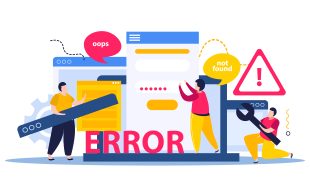Table Of Contents
- The Three Standard Requirements For A Company To Follow For Bookkeeping.
- 1. The System Should Support Registration
- 2. IT Security Standards
- 3. Automation Of The Administrative Process
- Most Common Bookkeeping Mistakes In Denmark
- Mistake 1 – Delaying Bookkeeping Until The Last Minute
- How To Avoid It:
- Mistake 2 – Poor Documentation Of Transactions
- How To Avoid It:
- Mistake 3 – Misunderstanding VAT Rules For Cross-Border Sales
- How To Avoid It:
- Mistake 4 – Choosing The Wrong VAT Reporting Schedule
- Mistake 5 – Ignoring Data Backup And Security
- How To Avoid It:
- Things To Remember About The Common Bookkeeping Mistakes
- Frequently Asked Questions
Bookkeeping In Denmark – Common Mistakes And How To Avoid Them
People know Denmark’s bookkeeping system for its clarity, efficiency, and full digital friendliness.
However, various new entrepreneurs, especially those arriving from other EU countries, often commit several mistakes.
However, the entrepreneurs can simply avoid these mistakes.
Moreover, these common bookkeeping mistakes often lead to fines, delays, or unnecessary stress.
Entrepreneurs should be aware of these pitfalls and know how to avoid them. Moreover, entrepreneurs should essentially run a compliant and financially healthy business
Moreover, the Bookkeeping System in Denmark follows certain strict guidelines. Thus, the bookkeepers should comply with the required criteria.
The businesses should register themselves with the Danish Business Authority before they market themselves in Denmark.
Moreover, the companies with customized bookkeeping systems should be responsible for ensuring that the Systems meet the needs and requirements of.
The Three Standard Requirements For A Company To Follow For Bookkeeping.
The Bookkeeping Act and the Executive Order, moreover, suggest three standards for the companies to maintain in their bookkeeping systems. Moreover, the information has been received from the official website of the Danish Business Authority.
Moreover, the three systems are as follows
1. The System Should Support Registration
Moreover, the System should be able to support the registration of the company’s continued transactions. The systems should be able to display the indications of the attachment and the safe storage of attachments for atleast 5 years.
2. IT Security Standards
The system should abide by all the required IT security measures for Bookkeeping. The system should maintain proper security measures related to user access management.
3. Automation Of The Administrative Process
Moreover, the systems should be able to support automation in the day-to-day administrative processes.
This includes receiving and sending the books, as well as launching standardized e-invoices.
Most Common Bookkeeping Mistakes In Denmark
There are multiple common bookkeeping mistakes that are committed by people in general.
Mistake 1 – Delaying Bookkeeping Until The Last Minute
People often leave bookkeeping tasks until the end of the quarter or even the year. Moreover, this is one of the most common errors.
Moreover, this mistake often leads to the missing of invoices, forgotten expenses, and inaccurate VAT reports.
How To Avoid It:
People should make bookkeeping in Denmark a regular habit. Moreover, they should set aside a specific time each week to enter transactions.
The entrepreneurs should reconcile bank statements and upload receipts to their accounting system.
Moreover, many Danish businesses use cloud-based tools like Billy, Dinero, or e-conomic. Moreover, these tools help to make the process quick and painless.
Mistake 2 – Poor Documentation Of Transactions
Under the Bogføringsloven (Bookkeeping Act), every transaction must be supported by proper documentation.
Missing receipts, vague invoice descriptions, or incomplete contract details can trigger questions from the tax authorities (SKAT).
How To Avoid It:
Entrepreneurs should always request a valid invoice for business purchases and ensure it includes essential details.
Moreover, the details should include things such as the date, supplier information, and a breakdown of VAT.
Use accounting software that allows you to attach digital copies directly to each entry for easy retrieval.
Mistake 3 – Misunderstanding VAT Rules For Cross-Border Sales
For businesses trading within the EU, VAT treatment can get complicated. Many entrepreneurs mistakenly apply the wrong VAT rate or fail to document the customer’s VAT number when selling to another EU country.
How To Avoid It:
Familiarise yourself with the rules for intra-EU trade. For B2B sales to customers in another EU country, you may apply a 0% VAT rate — but only if you record and verify their VAT number through the EU VIES system. Keep all documentation as part of your bookkeeping records.
Mistake 4 – Choosing The Wrong VAT Reporting Schedule
In Denmark, VAT filing frequency depends on your turnover:
- Half-yearly – turnover under 5 million DKK,
- Quarterly – turnover between 5 and 50 million DKK,
- Monthly – turnover above 50 million DKK.
Some new businesses choose the wrong schedule at registration, which can cause reporting issues later.
How to avoid it:
Review your expected turnover carefully before registering for VAT, and consult an accountant if unsure. You can request to change your VAT period with SKAT if your actual turnover changes significantly.
Mistake 5 – Ignoring Data Backup And Security
Digital bookkeeping allows people to store financial records electronically. However, failing to back up this data or using insecure storage can put your business at risk.
How To Avoid It:
People should choose reputable cloud-based accounting platforms with strong security measures and automatic backups.
Additionally, people should store copies of key financial reports locally or in a separate secure cloud storage system to protect against data loss.
Bookkeeping in Denmark is designed to be efficient and transparent, but even a small oversight can disrupt your business operations.
By keeping records up to date, understanding VAT rules, maintaining proper documentation, and using the right tools, you can avoid the most common mistakes and focus on growing your business in one of Europe’s most entrepreneur-friendly environments.
Things To Remember About The Common Bookkeeping Mistakes
The providers of the registered digital bookkeeping systems should abide by the basic needs and standards of bookkeeping. Moreover, non-compliance with the system will lead to various penalties, which can be easily avoided.
Moreover, the providers should register their business with the Danish Business Authority. Thus, the bookkeepers and authorities should avoid the common bookkeeping mistakes.
Moreover, people from the other European countries often lack an idea about the.
However, this article should allow people to learn how to avoid the common bookkeeping mistakes.
Frequently Asked Questions
Here are the answers to some of the commonly asked questions about common bookkeeping mistakes.
Bookkeepers can not avoid registering their business with the Danish Business Authorities. Moreover, businesses should abide by all the standards of Book Kiping.
Moreover, Denmark uses two major Accounting standards in GAAP. The Danish standard and the US standard.
Business owners should adhere to the standards outlined in the Bookkeeping by Bookkeeping Act and the Executive Order. Moreover, they should get their business registered with the Danish Business Authority.
Moreover, a bookkeeper in Denmark is not allowed to avoid registering their business with the Danish Business Authorities.
Read Also:















